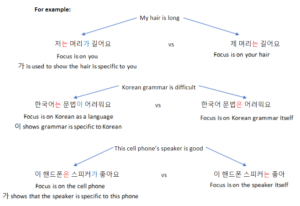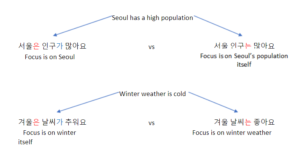Beginner 1 > Lesson 2
Lesson 2. Subject Particles : 은/는 & 이/가
Subject Particles: These are the particles that mark the subjects of a sentence.
There are 2 types:
| Topic marking particles | Subject marking particles | |
| Preceding noun with 받침 | 은 (e.g. 이것은) | 이 (e.g. 이것이*) |
| Preceding noun without 받침 | 는 (e.g. 저는) | 가 (e.g. 제가**) |
*Note: When 이거 is combined with either 이/가 particle, it can be abbreviated to 이게. This is more common, especially in spoken Korean. The same applies to 저거/그거 forming 저게/그게. e.g., 이것이/이거가 연필이에요 = 이게 연필이에요- This is a pencil
**Note: When 가 is used as a particle with 저, its form changes to 제 and thus forms 제가
The same applies to 나 which becomes 내가 and 너which becomes 네가 (pronounced as 니가)
Example sentences
I am a student. – 제가 학생이에요. (존댓말)
My dad works every day. – 아빠는 매일 일해요. (존댓말)
The teacher likes Korean food. – 그 선생님이 한국 음식을 좋아해요. (존댓말)
I am a beautiful lady. – 내가 미인이야. (반말)
Usages and differences
There are 2 basic usages to know: Centre vs Non-centre and General noun vs Specific noun
1) Centre vs Non-centre:
The noun which acts as the focus of the sentence is attached to 은/는.
The noun which isn’t necessarily the focus of the sentence is attached to 이/가.
– This is why 은/는 can be referred to as the TOPIC marking particle since it highlights the topic that the sentence is focused on
은/는 Examples:
제 이름은 은지예요. – My name is Eunji.
저는 의사예요. – I am a doctor.
저는 서울에 살아요. – I live in Seoul.
저는 한국 드라마를 매일 봐요. – I watch Korean drama every day.
저희 아빠는 병원에서 일하세요. – My dad works at a hospital.
저희 가족은 행복해요. – My family is happy.
한국은 아시아에 있는 나라입니다. – Korea is a country in Asia.

이/가 Examples:
A: 부산에 또 놀러 와. – Come visit Busan again.
B: 제가 서울에 살아요. 그래서 자주 못 와요 – I live in Seoul, so I can’t come often.
The phrase “I live in Seoul” is not used as general information but rather as an explanation/reason for the follow-up sentence. Therefore, the focus is more on the fact that you live in Seoul instead of the fact that you live in Seoul. In this way, 이/가 would be more natural to use.
It is however possible to say 저는 서울에 살아요 but since this shifts focus onto you, it may come across arrogant depending on tone (this is more of a feeling/nuance that your sentence develops more than you seeming outwardly narcissistic)
A: 왜 울고 있어요? – Why are you crying?
B: 고양이가 다쳤어요. – My cat got hurt.
이/가 is used since the focus is on why you are crying and not the cat itself.
In this context, 이/가 can also be used to specify my cat versus a cat in general (more on this later.)
A: 서울에 사는* 사람 알아요? – Do you know anyone who lives in Seoul?
B: 은지가 서울에 살아요 – Eunji lives in Seoul
*this ‘는’ is not a subject marker; it belongs to a different grammar called “verb’s modifier form” which we’ll learn later.
Again, the focus is on who lives in Seoul rather than Eunji herself.
제프가 노래를 못하네 – Jeff is a bad singer
Here, it is not necessary to put emphasis on who Jeff is since it may already be obvious by context (e.g., Jeff is the only one on stage at a concert) and so 이/가 can be used. In this way, focus is more on the fact that he is “a bad singer” rather than on pointing him out.
제프는 노래를 못하네 – Jeff is a bad singer
Contrasting the above example, this phrase could be natural in a context where you want to highlight Jeff. For example, Jeff is now part of a band onstage.
2) Noun is General vs Specific:
은/는is used when the noun is something general or you’re giving universal facts about it.
이/가is used when the noun is specific or you’re referring to the noun in a specific situation, example or circumstance.
Example sentences:
아기는 울어요 – Babies cry – a general, universal fact about babies
아기가*** 울어요 – The baby cries – a specific baby in a specific time/circumstance
***This can be made more specific by adding modifiers such as 이/저/지수의/어떤, but often the 이/가 particle is enough to highlight the specific baby that you are referring to
고양이는 생선을 먹어요 – Cats eat fish – a general, universal fact
고양이가 생선을 먹어요 – The cat eats fish – a specific cat in a specific time/circumstance
NB: In both of these examples, 이 아기는 울어요/ 이 고양이는 생선을 먹어요are probably uncommon sentences since the information you are giving are general facts about all babies/cats and so wouldn’t often give someone this information about a specific baby/cat.
However, if the information you are giving about the general behaviours/actions of a baby/cat is specific to this baby/cat, then this would become natural. For example, 이 고양이는 가끔 생선을 먹어요 (“This cat sometimes eats fish”) or 이 아기는 매일 울어요 (“This baby cries everyday”) could be natural since these general behaviors are specific to the baby/cat in question.
친구는 도와줘요 – Friends help – a general, universal fact
친구가 도와줘요 – A (specific) friend helps.
해는 동쪽에서 떠요 – the Sun rises in the East – general fact
NB: 해가 서쪽에서 떴나 봐요 (“The Sun must’ve risen in the West”) is an idiomatic expression that shows that something very out of the ordinary has happened. For example, someone who normally wakes up very late, suddenly wakes up at 6am. Here, 이/가 particle is used since this is not a general property of the sun but rather specific to the sun of that day.
3) When both 은/는 and 이/가 are used in one sentence
Some sentences can have both particles within it. As per the rules above, the different particles are used to either highlight the focus of each sentence or to show whether information is general or specific to a noun.


More examples:
지수는 성격이 좋아요 – Jisoo has a nice personality (lit. as for Jisoo, her personality is good)
이 집은 사과가 비싸요 – Apples in this store are pricey/expensive.
첫 인상은 중요해요 – First impressions are important.
인터뷰에서는**** 첫 인상이 중요해요 – In an interview, first impression is important.
****Note: 은/는 can not only be placed after nouns but also after other particles such as 에서 and 에 etc. This is NOT the case for 이/가 particle.
OVERALL USAGES (SUMMARY)
| Topic marking particle: 은/는 | Subject marking particle: 이/가 |
| When the subject is the focus/topic of the sentence | When the subject is NOT the focus/topic of the sentence |
| Giving general, universal information about a noun | When the noun is specific or you are referring to the noun in a specific situation, example or circumstance
|
If the noun is already specific, such as a name or pronouns (e.g., 아이유, 저, 선생님), either particle can be used with no change to the meaning. You would then choose which particle to use based on which noun you want to be the sentence’s focus.
For example:
아이유는 한국 출신 가수예요 / 아이유가 한국 출신 가수예요 – IU is a singer from Korea
Both would be grammatically correct since you are giving general information about a specific person and so both 은/는 and 이/가 are relevant. The only difference is that 아이유는 puts focus of IU whereas 아이유가 doesn’t.

